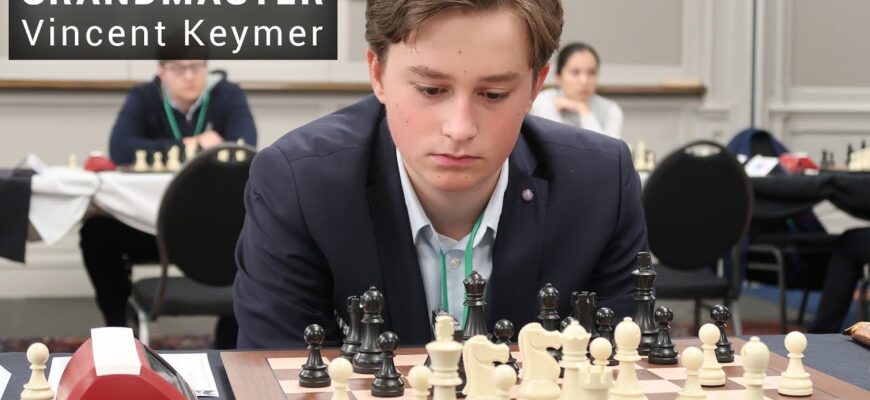In the high-stakes arena of professional chess, where every move is calculated and every decision scrutinized, the lives of grandmasters are often perceived as a singular pursuit of strategic mastery. It’s a world demanding rigorous study, travel, and intense mental fortitude. Yet, even among the brightest stars, a refreshing perspective sometimes emerges, reminding us that there is more to life than the 64 squares. One such voice belongs to German Grandmaster Vincent Keymer, whose recent reflections shed light on a remarkable journey driven by genuine passion, yet thoughtfully balanced with aspirations for a life beyond the chessboard.
The Prodigy`s Ascent: Where Enjoyment Meets Excellence
At a mere 19 years old, Vincent Keymer has already carved out a significant presence in the elite echelons of global chess. His trajectory has been nothing short of exceptional: achieving the grandmaster title at the tender age of 14, triumphing at the Grenke Chess Open over established super-grandmasters, and consistently demonstrating top-tier performance. His play is characterized by technical precision, a calm demeanor under pressure, and an astute understanding of complex positions – qualities that have firmly established him as one of the world`s most promising talents. But beneath the impressive resume and rising Elo ratings, Keymer grounds his connection to the game in a fundamental truth:
“Chess is something I really enjoy.”
This simple declaration, profound in its implication, carries considerable weight within a profession where the sheer weight of competition can often overshadow the initial spark of passion. For Keymer, this enjoyment is not a fleeting emotion; it appears to be the very foundation of his enduring commitment. It is the intrinsic drive that fuels countless hours of opening preparation, intricate middlegame analysis, and the resilience required to navigate the inevitable defeats inherent in any competitive endeavor. Without this deep-seated pleasure, the relentless pursuit of perfection in chess could very easily devolve from a fulfilling vocation into a demanding, joyless chore.
Beyond the Board: Cultivating a Balanced Existence
Keymer’s insightful perspective, however, extends beyond the intricate logic of chess variations. He has also articulated a notable aspiration: to “build a life outside of Chess.” This desire speaks volumes about a growing awareness among top athletes regarding mental well-being and holistic personal development. In an era where players can be consumed entirely by their craft, the deliberate cultivation of interests and relationships away from the competitive fray is both a pragmatic strategy and a sign of profound self-awareness.
One might observe the charming irony of a chess prodigy who, having mastered the profound complexities of a game, now seeks to master the seemingly ordinary complexities of everyday life. Yet, this pursuit of balance is not an indication of waning dedication; rather, it signifies a mature understanding that a well-rounded individual is often a more resilient and effective competitor. Hobbies, educational pursuits, social connections—these elements provide crucial anchors, mitigating the risks of burnout and fostering a broader perspective that can, perhaps paradoxically, even enhance one`s focus and performance at the chessboard.
The Demands and Rewards of a Grandmaster’s Journey
The life of a professional chess player, while often admired for its intellectual rigor, is far from universally glamorous. It involves extensive travel, frequently to solitary hotel rooms, followed by intense mental duels that can stretch for many hours. The preparation is exhaustive, demanding not only a vast memory for theoretical variations but also an uncanny ability to calculate deep strategic lines. Defeats are publicly scrutinized, and triumphs, though sweet, can be fleeting. In such an environment, the capacity to disengage, to immerse oneself in non-chess related activities, becomes an indispensable tool for mental recuperation and sustained performance.
Keymer`s approach exemplifies a modern understanding of athletic longevity. Success is not solely predicated on sheer physical stamina, but crucially on mental fortitude, which is significantly bolstered by a healthy integration of work and personal life. By actively pursuing interests outside of chess, he likely gains refreshed perspectives, effectively manages stress, and cultivates a sense of self that is not solely defined by his win-loss record. This holistic strategy may very well be the silent key to his sustained success in a profoundly high-pressure professional environment.
A Blueprint for Aspiring Talents?
Vincent Keymer`s narrative provides a compelling blueprint, not only for aspiring grandmasters but also for parents and coaches of young talents. While intense focus and dedication are undeniably prerequisites for achieving excellence, his emphasis on genuine enjoyment and the pursuit of a balanced life presents a more sustainable and ultimately more fulfilling path. It challenges the conventional wisdom that absolute immersion is the only route to the pinnacle, suggesting instead that well-being and broader personal growth are not antithetical to peak performance, but rather, perhaps, integral components of it.
In a world increasingly fixated on hyper-specialization, Keymer’s journey serves as a potent reminder that even at the zenith of intellectual sport, the essential human element—the sheer joy of the game, coupled with the desire for a rich and varied life—remains paramount. His story is a testament to the idea that true mastery might not just be about conquering opponents on the board, but also about building a life that is truly comprehensive, genuinely enjoyed, and profoundly well-lived.







